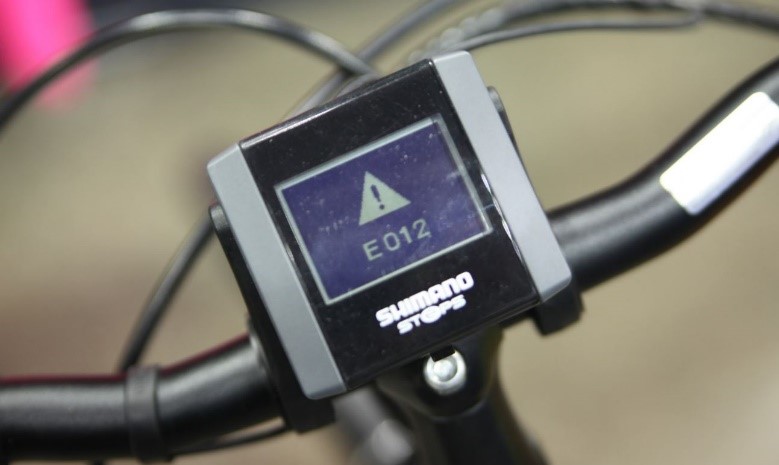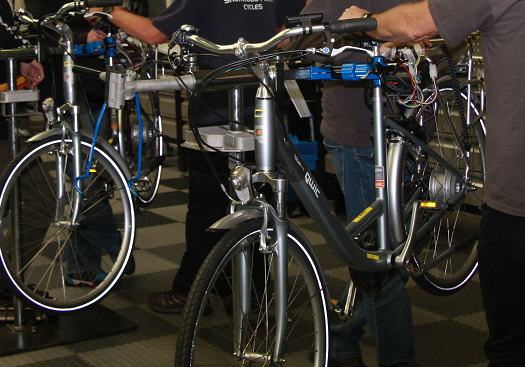Servicing e-bikes
< Back | Last revised: 19th March 2018
More and more e-bikes are being sold every day. The impact of this on the cycle workshop is that it is now not uncommon for an e-bike to be wheeled through the workshop doors with some kind of problem. Whether you sell e-bikes or not, your workshop should be prepared for this or you could be turning away lots more customers!
Workshop best practices
From new, an e-bike will often be shipped with a battery in a 'hibernation' mode. Shimano for instance ships its STEPS batteries with a 30% charge inside them. In this state the battery can take up to 5 years to fully run out of charge and become unusable. This means that the distributors have plenty of time to receive the batteries, store them and ship them to shops without the batteries losing all charge.
As soon as the battery is charged however, the battery awakens from this hibernation mode and the time to it becoming unusable is much shorter - perhaps only a year and a half in some cases, so regular monitoring of the battery is then required. It makes sense therefore, that when the shop builds an e-bike from new and charges the battery to 100% before putting the bike on display, that some sort of reference is taken as to the date of which it was charged so that regular top up charges can be performed to stop the battery from becoming unusable. A swing ticket hung from the bike or battery or a log placed in the workshop planner as to when the battery was last charged is a good idea. Charging up the display e-bike is something that's easily forgotten in a busy shop environment.

It may also be worthwhile sticking a sticker on the battery with the date of last charge written on, with spaces for the customer to document further charges. This could be particularly useful if the e-bike is used infrequently as a reminder to top the battery up every 3-4 months or so. This gets the customer into the habit of keeping the battery in good health and as an ideal the battery should be stored with at least 70-80% charge.
In a workshop environment have a clear flat surface in a well ventilated area for charging the e-bike batteries. Cycle workshops can become quite cluttered and a battery and charger can become quite warm when on charge so don't cover them with oily rags.
Also bear in mind that the charger itself will draw a small amount of electricity even when not charging the battery, so if you are leaving the charger plugged in and switched on at the plug you are adding to your energy bill, not by much granted, but every little helps right? Ensure also that you do not overload your sockets and distribute extension leads evenly between your wall point making sure that you only use one socket space per charger and don't use additional extensions from the extension leads. Consider also having a timer switch plug that you can set to cut the power out of shop hours. This could be particularly useful if you get home and remember you haven't turned the power to the chargers off - most chargers these days are 'intelligent' in the fact that they won't over charge the battery, but not all. At best you'd come back to an increased energy bill, at worst to no shop at all.
Battery chargers are also not cross compatible. It's good workshop practice to make sure that all the chargers are labelled as to what battery/bike they are for. For instance, a manufacturer may choose a stock charger body, but to make it specific for their brand of battery they will switch the poles of the charger, which could lead to devastating results if used with the wrong type of battery.
Health and Safety
From a safety point of view, make sure that you have your smoke alarms thoroughly inspected and a fire extinguisher capable of tackling electrical fires close by. It's worth having a box of sand that you could smother the battery with in the worst case scenario, as well as a set of tongs to drag the battery off of the bench as it will get very hot very quickly. Also, have a clear exit route to the outside, the smoke given off from an e-bike battery fire is very harmful. Having a metal container in which to store the batteries is a good idea, as is considering having someone trained in the shipment of hazardous materials - or at least contact your e-bike distributor before shipping e-bike batteries as there are some very strict rules when it comes to battery shipment.
Remember also that it is the shop's responsibility to recycle batteries responsibly. It could be a good idea to befriend a garage who recycles a lot of automotive batteries, for example.
Having a robust set of basic procedures in place should be considered as the back bone of an effective and efficient workshop. Adding these simple steps to your everyday working practices will help to decrease unnecessary costs and increase safety.
E-bike technical training

To give the cycle trade the knowledge needed to cater for the booming e-bike market Cytech has introduced the Technical e-bike course to provide the skills and confidence needed to set up, repair and sell a broad spectrum of e-bikes along with an understanding of the specific standards and legal aspects that apply to them.
Cytech technical e-bike is a comprehensive course covering electrical theory, current legislation, safe working practices when dealing with batteries and electrical units, removal and installation of components, diagnosis, testing and fault finding of the components and much more.
The Cytech technical e-bike course is suitable for those who are looking to stock and repair e-bikes with little knowledge of service procedures or the legislation requirements that apply when selling, servicing and riding e-bikes. It is available to those who already hold a Cytech technical two qualification or as a guide, 3-4 years industry knowledge.
Upon completion of the course, candidates will attain a Cytech qualification, recognised internationally as the training and accreditation scheme for cycle technicians, owned by the UK cycle trade via the ACT.
To find out more about the e-bike course offered by Cytech, see the Cytech technical e-bike page.


